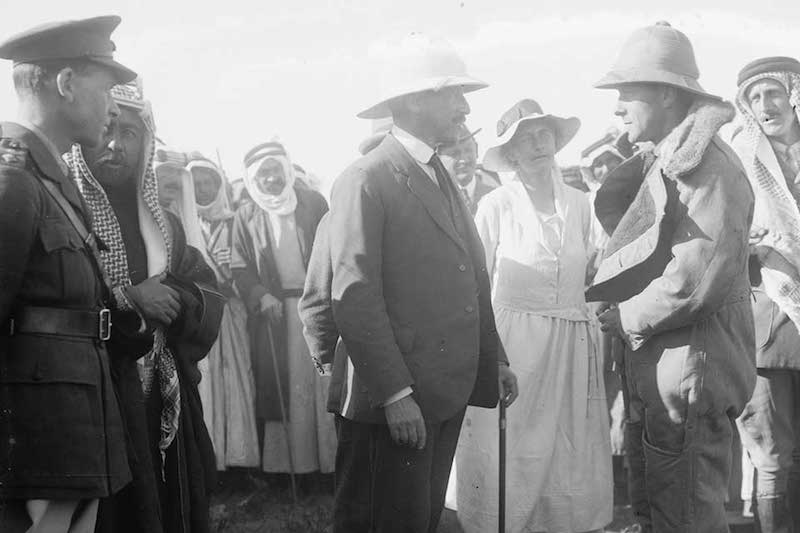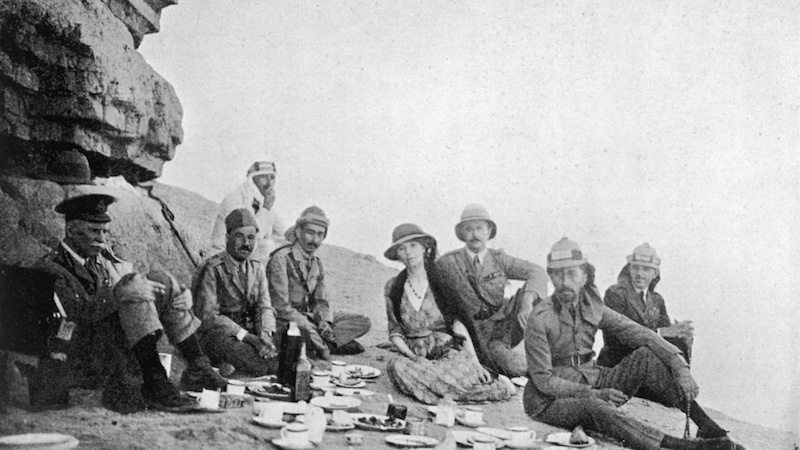Gertrude Bell (1868–1926)
Episode #9 of the course “Europe’s greatest explorers”
Gertrude Bell was a British scholar, researcher, and diplomat who explored Mesopotamia and Arabia and helped found the modern Middle East after the first World War. Her life was a series of being the one and only woman to do something, including being the first woman to graduate Oxford University’s Modern History degree with honors, one of the first female archaeologists, England’s first female intelligence officer, and the only woman invited to participate in the Cairo Conference in 1921.
Bell was born into a wealthy, liberal political family. Her mother died when she was three, and she was close to her father and grandfather, who were heavily involved in international politics. After graduating Oxford at age 19, she traveled to Persia to visit her uncle. Bell spent the next decade exploring the Middle East, scaling the Alps, and learning to speak six languages. Her travels through the Bernese Alps led her to discover new mountains and routes, breaking at least 10 records of her time.
To report her experiences throughout the Middle East back to Europeans, Bell published books that contained vivid descriptions and a series of photographs. She detailed her accounts of Syrian cities like Damascus and Jerusalem, excavated with biblical scholars along the Euphrates River, and finally made her way to Babylon.
During World War I, Bell was first stationed in France and then worked as a spy for British intelligence. She was sent to Cairo, where she was partnered with T.E. Lawrence, another British explorer in Arabia whom Bell had met previously. It was their mission to get the Arabs to join the Europeans in an alliance against the Turks, as well as to gather information about the region, local politics, and power shifts.
Bell was sent to Basra and Baghdad and reported about the horrors and butchery of the Kurds’ mass genocide of Armenians. Her reports about the customs and politics of the local people were extensive, and she strongly advised against British colonialism.
At the end of the war, the Ottoman Empire was being dismantled. Bell was asked to report her recommendations for Mesopotamia. Her 1920 report “Self-Determination in Mesopotamia” made her beliefs very clear. Bell was in the middle of the region’s politics, acting as mediator between the local Sunni, Shiite, and Kurd leaders and the British government, including Winston Churchill.
In 1921, Churchill agreed that Mesopotamia should be a self-ruling state, and Bell was a central figure at the Cairo Conference, where the creation of modern-day Iraq took place. Her presence and diplomatic influence were essential to its establishment.
Returning to Baghdad, Bell served on the board of the Baghdad Peace Library, which is currently the National Library of Iraq. She also founded the Baghdad Archaeological Museum, which later became the Iraqi Museum. It was Bell’s intention to preserve Mesopotamian, Babylonian, Syrian, and other Middle Eastern history through extensive collections. The museum opened in 1926, shortly before her death.

Gertrude Bell looks on as Sir Herbert Samuel, the British high commissioner in Palestine, greets a pilot in Jordan in 1921
In the final years of her life, Bell suffered several health issues as well as a dwindling fortune. She died in 1926 from an overdose of sleeping pills.
Recommended book
“Gertrude Bell: Queen of the Desert, Shaper of Nations” by Georgina Howell
Share with friends


